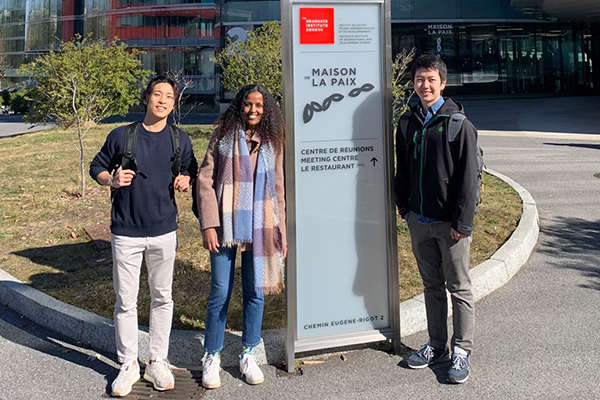
By Jonghyeong Park, 2021-23 Rotary Scholar
In 2021, I was awarded a Rotary Scholarship to pursue a master’s in development studies at the Geneva Graduate Institute. This generous assistance allowed me to pursue becoming a global leader in humanitarian work.
I first developed an interest in global peace and humanitarianism while studying international politics at Chung-Ang University, researching and writing papers on how the international community responds to crises like the Rwandan Genocide and conflict in the Middle East. This academic curiosity naturally led me to seek practical experience, which I gained through internships at the United Nations Office for the Coordination of Humanitarian Affairs (UN OCHA) and the Korean Red Cross, where I witnessed firsthand the profound impact of humanitarian crises on individuals and societies.
During my UN OCHA internship in Fiji, I had my first encounter with Rotary. I noticed the Rotary logo on the wall while dining at a restaurant. Curious, I struck up a conversation with the restaurant owner, who turned out to be a Rotarian. He introduced me to Rotary’s scholarship program. The values and goals of Rotary resonated deeply with my own aspirations, and I felt an immediate connection.
A time of growth in Geneva
I applied for and received a global grant scholarship with the support of the Rotary Club of Cheongju Dream, and later the Rotary Club of Jincheon Bonghwa. The two years I spent at the Geneva Graduate Institute were more than just an academic experience; they were an opportunity to engage with peers from around the world and immerse myself in diverse cultures and ideas.
In Geneva, a hub for international organizations, I had many opportunities to participate in real-time discussions and lectures on humanitarian crises and global issues. These experiences honed my ability to analyze and understand complex international problems from multiple perspectives and provided invaluable networking opportunities with professionals working in the field.
While I was in Geneva, the Ukraine-Russia war broke out, leading to an influx of Ukrainian refugees in the city. The knowledge I was gaining about international relations and humanitarian crises motivated me to engage directly with these refugees and I developed a deep empathy for their suffering.
Additionally, I had the opportunity to attend a meeting on a project supporting vulnerable groups affected by the Ukraine conflict, organized by the Rotary Club of Lausanne. Witnessing Rotary’s practical humanitarian efforts in collaboration with local communities deepened my understanding of how impactful and necessary these initiatives are.
Supporting those forced to migrate
After completing the program, I began serving as a project officer at the International Organization for Migration (IOM) in the Solomon Islands. The IOM, the UN Migration agency, is supporting people forced to migrate due to conflict, climate change, and political oppression.
The Solomon Islands, where I am based, is an archipelago in the South Pacific, consisting of six large islands and over 900 smaller ones, making it highly vulnerable to the impacts of climate change. Our office focuses on supporting residents who may need to leave their homes due to these environmental changes, working to minimize the negative effects they face.
My role specifically involves managing climate change and disaster resilience projects. This includes developing educational materials to increase community resilience, collaborating with local communities and government agencies, and designing communication strategies with international organizations to ensure the successful execution of our projects.
Vision and mission strengthened by Rotary
My Rotary scholarship connected me with a global network of mentors and provided opportunities to contribute to peacebuilding. Even after completing the program, I continue to engage with Rotary members, fostering collaboration in my work with IOM.
Looking ahead, I remain dedicated to strengthening disaster resilience and promoting sustainable development in regions affected by climate change through my work with IOM. Listening to the voices of the most impacted communities, I aim to contribute to strategies that help nations and local societies adapt to and mitigate the effects of climate change.
Finally, I would like to express my deepest gratitude to the Rotary members and donors who made my scholarship possible. Your support was crucial not only for my academic achievements but also for providing me with the opportunity to contribute to global peace. I will continue to uphold Rotary’s values and strive to make a positive impact wherever it is needed in the world.
https://blog.rotary.org/2024/09/24/rotary-scholar-on-the-frontlines-of-climate-change/
